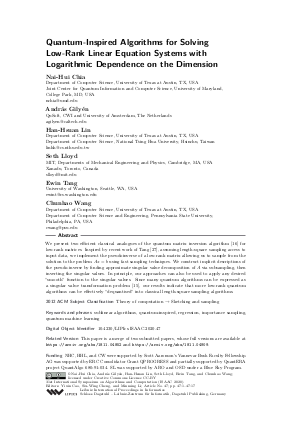@InProceedings{chia_et_al:LIPIcs.ISAAC.2020.47,
author = {Chia, Nai-Hui and Gily\'{e}n, Andr\'{a}s and Lin, Han-Hsuan and Lloyd, Seth and Tang, Ewin and Wang, Chunhao},
title = {{Quantum-Inspired Algorithms for Solving Low-Rank Linear Equation Systems with Logarithmic Dependence on the Dimension}},
booktitle = {31st International Symposium on Algorithms and Computation (ISAAC 2020)},
pages = {47:1--47:17},
series = {Leibniz International Proceedings in Informatics (LIPIcs)},
ISBN = {978-3-95977-173-3},
ISSN = {1868-8969},
year = {2020},
volume = {181},
editor = {Cao, Yixin and Cheng, Siu-Wing and Li, Minming},
publisher = {Schloss Dagstuhl -- Leibniz-Zentrum f{\"u}r Informatik},
address = {Dagstuhl, Germany},
URL = {https://drops.dagstuhl.de/entities/document/10.4230/LIPIcs.ISAAC.2020.47},
URN = {urn:nbn:de:0030-drops-133916},
doi = {10.4230/LIPIcs.ISAAC.2020.47},
annote = {Keywords: sublinear algorithms, quantum-inspired, regression, importance sampling, quantum machine learning}
}

 Creative Commons Attribution 3.0 Unported license
Creative Commons Attribution 3.0 Unported license

